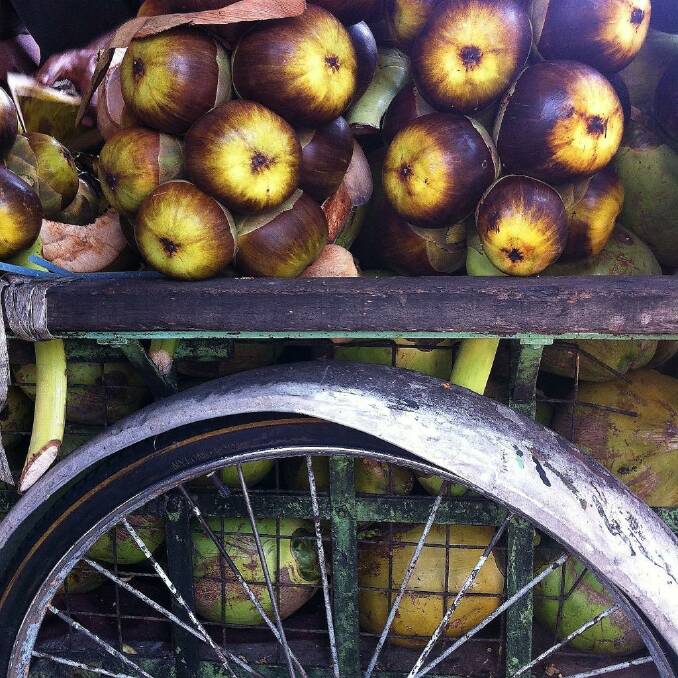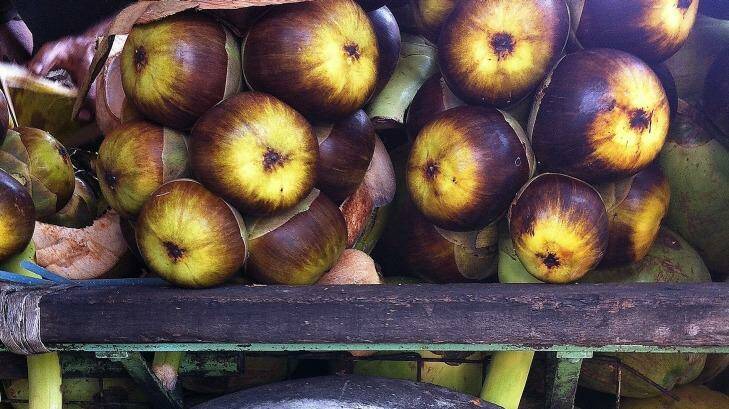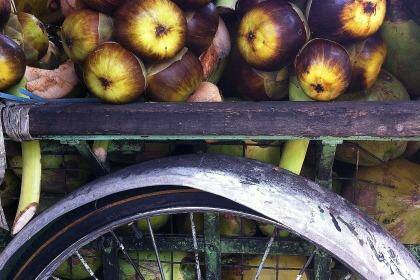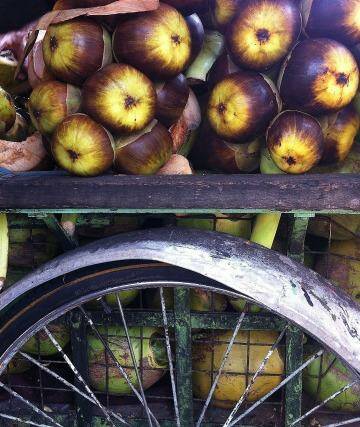



All it takes is one mouthful of Baba-Nyonya and Penang's history comes to life. At a table inside a colonial-era building in the heart of George Town's UNESCO World Heritage Site, I dip my spoon into a bowl of Assam hae, stir-fried prawns in tamarind sauce. It's a simple dish – prawns, tamarind paste, sugar and salt – but it tells a long and complicated story.
Subscribe now for unlimited access.
$0/
(min cost $0)
or signup to continue reading
The Assam hae contains within its sour-sweet flavours and chili-infused heat centuries of migration and assimilation and mixed marriages. It fuses the cuisines of the merchants who migrated to the Straits of Malacca – mostly Chinese and Indian – with those of the Malay women they married. Known as Peranakans (which, translated, means 'locally born'), this distinct cultural group developed its own homogenous cuisine called Baba-Nyonya – Baba for the foreign husbands, Nyonya for their Malay wives.
Here at Aunty Gaik Lean's Old School Eatery in George Town, the food is an explosive fusion of Chinese, Malay and Indian flavours. Beside the Assam hae is a bowl of Nyonya chicken rendang and another containing sambal brinjal – eggplant cooked in a sweet sambal sauce. There are Chinese springrolls with a Malay twist and glasses of Baba-Nyonya's signature drink, lau hau peng – an infusion of nutmeg paired with sugar syrup and served icy cold. Little wonder these flavours have lent Penang its reputation as the food capital of Malaysia and a global culinary hotspot.
This little island, lying off the northwest coast of the Malaysian peninsula and containing within it a rich brew of cultures, is also known as the Pearl of the Orient because, "quite frankly, everyone came here," says guide Indra Solomon.
"The Arabs came here, the Acehnese, the Indonesians, the Burmese, the Indians. The monsoon changes, they go back home. It was a very convenient place for trade."
Solomon herself is second-generation Indian. She inhabits with ease George Town's Little India, its streets suffused with incense and spice, its outdoor tandoori ovens and samosa hawkers and food carts loaded with jelebi and banana bajji and sweet puri, its markets heaving with bitter gourd and Indian ginger and Malaysian ginger, dried lady finger and sabja seed, dried salted chilli and dates and that heavenly sweet treat, jaggery. Solomon has tweaked and adapted her ancestors' customs to suit her contemporary life here on the island of Penang, and in so doing embodies its status as a cultural melting pot.
"I follow very old traditions – look at my bindi," she says, pointing to the silver dot on her forehead.
"It should be black because I'm not married, but because I'm a modern woman I can choose any colour I like!"
Solomon pastes a sparkling bindi onto my own forehead – green, to match my eyes. She leads me to Little India's Penang Street and the unpretentious Sri Ananda Bahwan Restaurant, the "best banana leaf restaurant in town". My lunch plate is a broad, lush-green banana leaf. A waiter puts pappadums and spoonfuls of rice onto it, and sets down tiffins containing tandoori chicken (cooked in the outdoor oven), butter chicken and two types of dal: one with radish and the other with spinach. There's a bowl of cumin, garlic and chilli-infused soup, and containers filled with mint sauce and sweet mango pickle. The accompanying drink is cardamom tea.
As a nod to Solomon's heritage, I eat my meal the Indian way, pinching the rice in the fingers of my right hand and adding to it scoops of chicken and dal as I go. Afterwards, I queue to rinse my food-sullied hands behind other diners – regulars, by the look of them, for their T-shirts and faces lack the tell-tale, rookie food stains that have spattered mine.
The spices used to flavour these dishes – and which were traded frenetically during Penang's colonial era – all flourish in the Tropical Spice Garden at Teluk Bahang, an hour's drive from George Town on Penang's north coast. It's a magical, terraced allotment planted beside the sea. More than 500 floral species thrive here, ornamental plants and medicinal herbs, poisonous plants and – most importantly, says my guide Choo Kok Leong – spices.
"The function of pepper, no matter the species, is always the same," Leong remarks. "To enhance taste, cure bacteria and deal with indigestion."
Pepper, he says, is easy to propagate, and in Penang its leaves are added to egg to make a "local omelette"; the wild version is used in the Baba-Nyonya dish otak-otak.
These terraces are heaving with nutritious life: here is a bank of banana trees, whose palms were used as crockery at the Indian restaurant in George Town. There is the fishtail palm whose fruit attracts stingless bees which produce beautiful honey. Coconut palms arise all over the garden, and no wonder, for there are 300 varieties of this tree in Malaysia. Solomon and I had shared a coconut in Little India, drinking the sweet water – considered sacred because it remains untouched until the moment the fruit is cracked open – and asking the hawker to scrape the meat free of its shell so that we could eat it.
"To understand a plant is very, very important," Leong says. "You can use it for everyday life."
For example: the cat whisker plant can be used to fight cancer, diabetes, kidney stones and hypertension. Lemongrass and citronella look identical but can be distinguished by their smells; one is used in cooking, the other as an insect repellent. Stevia can be used as a sugar replacement and a male contraceptive. Ginger, cloves and cardamom keep you awake, but nutmeg puts you to sleep.
"The timing is very important," Leong says. "And everything in moderation."
The spice garden is a profusion of fragrance released by Penang's unremitting heat. I can detect the mild scent of wild cinnamon and the stronger Ceylon cinnamon, the clove oil that stimulates one's energy and the world's second most expensive spice after saffron, vanilla. But it's the turmeric that's evoking memories for Leong.
"When I was a kid, if I failed my exam, my Indian classmates shared with me, 'you must eat some turmeric'." Nowadays, a lot of ancient wisdom young people are not going to follow."
Perhaps not; but still, so many ancient practices thrive here. Back in George Town, at the Clan Jetties built by Chinese Hokkien immigrants in the 19th century, hawkers are setting up their stalls. The food is simple, based on the seafood those early migrants would catch just off the jetties: Hokkien lee (prawn noodle soup), fish head bee hoon, oyster porridge. This is where the rich and diverse traditions of this little island live: not in museums, but out on the streets.
TRIP NOTES
MORE INFORMATION
GETTING THERE
Malaysia Airlines flies to George Town via Kuala Lumpur from Sydney, Melbourne, Adelaide, Perth and Darwin. See malaysiaairlines.com.
STAYING THERE
Prices for a superior room at The Royale Bintang Penang start at around $100, including tax. Shangri-La Golden Sands Resort's executive sea-view rooms start at around $200 including tax. Prices vary according to season and availability.
DINING IN GEORGE TOWN
Aunty Gaik Lean's Old School Eatery, No 1 Bishop Street; My Nyonya Favourites, 20F Lebuh Penang; Sri Ananda Bahwan Restaurant, 55 Lebuh Penang, Little India. See srianandabahwan.com.my.
Catherine Marshall was a guest of Tourism Malaysia and Malaysia Airlines.

